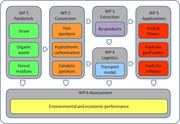Objectives
Project structure

The project addresses the complete value chain from feedstock potential, the investigation of pyrolysis and hydrothermal carbonisation conversion technologies, the optimisation of transport and logistics to the exploitation of the energy carrier and its by-products. The techno/economic and environmental assessment includes the complete supply chain.
more informationConsortium
13 beneficiaries from 6 countries (Austria, Finland, Germany, Greece, The Netherlands, Poland).
more informationObjectives
The overall objective of BioBoost is to pave the way for de-central conversion of residual biomass to optimised, high energy density carriers, which can be utilised in large scale applications for the synthesis of transportation fuel and chemicals or directly in small-scale combined heat and power (CHP) plants.

|
Increasing the share of biomass for renewable energy in Europe demands conversion pathways which are economic, flexible in feedstock and energy efficient. The project concentrated on dry and wet residual biomass and wastes as feedstock for de-central conversion by fast pyrolysis, catalytic pyrolysis and hydrothermal carbonization to the intermediate energy carriers oil, coal or slurry. |
  |
Major activities included the analysis of economic efficiency of the complete production pathways, the optimization of logistic chains and the investigation of environmental compatibility. BioBoost aims at making a substancial improvement towards increasing the efficiency of the use of biomass and residues in the future.   |
Â
